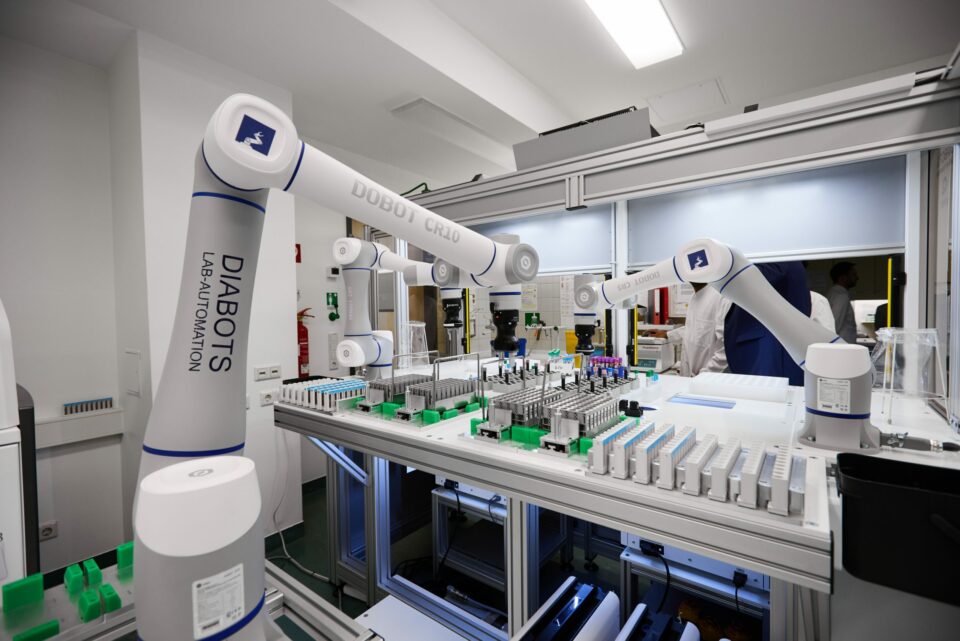Customer Story

Helsana
Query speeds improved up to 10x, data loads cut from 26 to 4 hours, and license & maintenance costs reduced by 65%—giving Helsana more agility and lower costs.

Labor Berlin is Europe’s largest hospital laboratory. With the introduction of Exasol, the turbo was ignited in the data warehouse. Performance challenges have been eliminated. Performance analyses and statistical reports are available much faster. Ultimately, this also benefits the healthcare system and millions of patients.
The migration to Exasol has relieved the burden on the productive system at Labor Berlin and significantly accelerated processes. Large volumes of data are imported and processed more quickly with the new solution. In this way, the combination of Exasol and Tableau now ensures faster provision of relevant key figures and evaluations.
By migrating to Exasol, Labor Berlin benefits from:
Labor Berlin is the first joint subsidiary of Charité – Universitätsmedizin Berlin and Vivantes – Netzwerk für Gesundheit. The hospital laboratory produces 65 million laboratory analyses per year for 85% of all hospital beds in Berlin in over 30 clinics and for more than 100 registered doctors. Digital processes are the pillar of day-to-day business. They must function reliably around the clock in order to cope with the enormous volumes of data. Today, Exasol enables more sophisticated analyses and a significant increase in performance.
Germany
650
Healthcare
DWH powered by the Exasol Analytics Engine
Labor Berlin wanted to reduce the load on its production system and optimize its data models. The central laboratory information system not only generates information about the samples submitted. The IT team also uses it to determine various relevant key figures. These include, for example, the number of samples received or the number of orders that are still being processed.
Due to the Covid-19 pandemic, the already high number of daily samples has multiplied, bringing with it additional requirements for quickly available data for control and reporting. This has further increased the demands on IT. The basis for the evaluations required during the pandemic is coronavirus test data, which the ALM (Association of Accredited Laboratories) exchanges as part of a reporting chain. This data is then passed on to higher-level authorities such as the Robert Koch Institute (RKI) and the health authorities and is incorporated into statistics and studies. At the end of the reporting chain are the affected patients. Thanks to rapid processing and evaluation of their personal samples, they find out more quickly whether they are ill or not. The rapid and clear provision of data has tied up considerable resources and has pushed the solutions used to date to their limits.
The laboratory information system previously operated on a central server and on an Oracle and a PostgreSQL database. All digital processes related to the receipt and evaluation of samples and the feedback to the senders ran together here. These evaluation processes are time-critical, and there are also high data protection requirements.
The existing system was overwhelmed by the volume of processes. It was reaching its limits in terms of performance and the rapid growth in data meant that bottlenecks occurred time and again, which is why an alternative solution became necessary.

The list of requirements was drawn up together with Exasol partner M2. technology & project consulting GmbH, which had already supported Labor Berlin with the introduction of the business intelligence (BI) reporting tool Tableau.
The requirements called for a solution that:
M2 suggested setting up Exasol on the Labor Berlin data warehouse.
The project included the migration to Exasol as well as performance tuning and optimization of the data model. A test installation was initially implemented on the basis of the free Community Edition, with which Labor Berlin was able to put the function and performance of Exasol through its paces during operation.
“In our opinion, Exasol was the best solution for Labor Berlin,” says Stefan Ladenthin from M2. “The database is currently proven to be the fastest on the market. It also offers good integration with the existing ETL tools in use at Labor Berlin.”
After the successful test, the PostgreSQL database was replaced by Exasol within half a day. To speed up Tableau’s processes, M2 installed Exasol with 1 TB as a speed layer on the data warehouse. Thanks to Exasol’s excellent Tableau integration, the two systems work together smoothly. As a result, both the data transformation processes and BI reporting run considerably faster than before.
The optimization of the data model was also implemented, which led to significant improvements in the processes. Exasol is able to deliver data to the BI solution Tableau with very high performance. It enables a live connection, which means that Tableau data extracts no longer need to be used. This improves the speed and productivity of the dashboards. As a result of the adjustments made, Labor Berlin was able to reduce the loading times of its dashboards by around 90%, thereby achieving a significant improvement in performance and offering almost “live data” in Tableau. This meant that information could be distributed more quickly to the relevant departments (e.g. hospital hygiene). This allows a clearer statistical classification of the pandemic development.

The use of Exasol also relieves Labor Berlin’s IT staff, as the solution is easy to use and low-maintenance. In addition, the hospital laboratory or Labor Berlin again benefits from the solution’s wide range of functions. Flexible applications can be implemented to optimize the day-to-day work at Labor Berlin.
“By using Exasol, we were able to set up a ‘real-time dashboard’ for SARS-CoV-2 diagnostics, among other things,” explains Nikolaus Wintrich, Chief Operating Officer at Labor Berlin. “This gave us an immediate overview of the number of samples, their processing status and the positivity rates, among other things.” Thanks to the rapid evaluation and processing of the data, Labor Berlin can now provide those submitting samples with important reports and statistics much more quickly. Internal processes can now also be better planned and organized. “In this way, we always have an overview of the situation and can continuously provide the senders of samples as well as the RKI, the health authorities and politicians with reliable, up-to-date data,” says Wintrich. “This makes the development of the pandemic more transparent for everyone involved.”